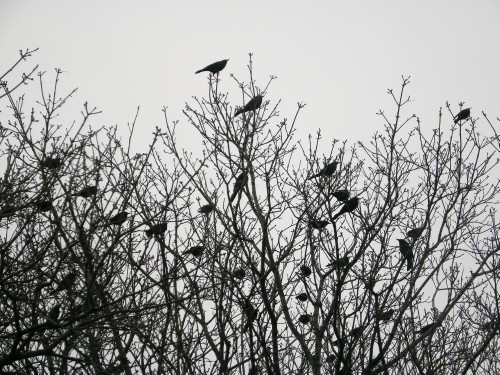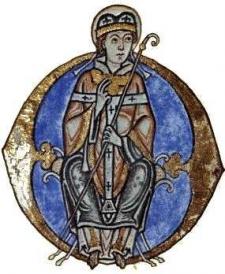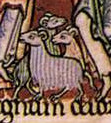Entries in St. Anselm of Canterbury (1)
We set out famished

It wouldn't be a Lenten resolution without falling off the wagon. After a few days of more worldly blogging, I was reminded of spiritual concerns by this raucous backyard flock of grackles (I think they're grackles, from their tails). Not sure why; something about the gray sky and slightly ominous birds said "Repent, you ADD-afflicted sloth." Hey, I said they were raucous.
Since I've been thinking (okay, moping) lately about what I Really Want to Be When I Grow Up...and wondering why I am still having this conversation past my half-century mark...I decided to look for prayers of discernment. In secular terms, a "discerning eye" means, say, being able to tell natural fiber from polyester at 20 paces; in Catholic parlance, discernment is often shorthand for recognizing a vocation to the priesthood or convent. But the deeper meaning implies being open to learning God's will for your life. It's not so much squinting to discern a pattern, as shutting up and listening for a whisper (or, occasionally, a studiously ignored holler).
 St. Anselm of CanterburyThe Thomas Merton prayer with which I began Lent is, indeed, a good start, from a place of not-knowing. Spiritual Googling turned up two prayers by St. Anselm that express a hunger for God's presence and guidance. Anselm was an Italian Archbishop of Canterbury who discerned the need to bust the chops of the king of England after the Norman Conquest. But first, the prayers.
St. Anselm of CanterburyThe Thomas Merton prayer with which I began Lent is, indeed, a good start, from a place of not-knowing. Spiritual Googling turned up two prayers by St. Anselm that express a hunger for God's presence and guidance. Anselm was an Italian Archbishop of Canterbury who discerned the need to bust the chops of the king of England after the Norman Conquest. But first, the prayers.
St. Anselm Prayer for Discernment I
O Lord, my God, teach my heart this day where and how to see you, where and how to find you.
You have made me and remade me, and you have bestowed on me all the good things I possess, and still I do not know you. I have not yet done that for which I was made.
Teach me to seek you, for I cannot seek you unless you teach me, or find you unless you show yourself to me.
Let me seek you in my desire; let me desire you in my seeking. Let me find you by loving you; let me love you when I find you.
St. A Prayer for Discernment II
O Lord: my heart is made bitter by its own desolation; sweeten it by Your consolation.
I beseech You, 0 Lord, that having begun in hunger to seek You, I may not finish without partaking of You. I set out famished; let me not return still unfed.
St. Anselm, Royal-Butt-Kicking Archbishop of Canterbury
How did I never hear of this guy? Here's a good thumbnail from the blog Communio:
Saint Anselm is a towering figure in monastic, theological and philosophical circles whose works take diligence in getting your mind around. [Ah, that's how I never heard of him.--Ed.] Even centuries later he speaks with precision. Saint Anselm of Canterbury (c. 1033-1109) an Italian by birth, held various academic and ecclesial titles; he was the archbishop of Canterbury from 1093 until his death in 1109. The Church tells us he is the father of scholasticism and famous for the ontological argument for God's existence.
 Meditations of St. Anselm, 12th Century manuscript (WGA)My mind shuts down at the word "ontological," but Anselm also "created a tradition of intimate, intensely personal prayer" according to this collection of his works. And he had far more secular wranglings with King William II, the son of William the Conqueror. Their royal versus ecclesial tug-of-war was classic medieval politics-as-usual, made famous later by Becket and then again by Henry VIII.
Meditations of St. Anselm, 12th Century manuscript (WGA)My mind shuts down at the word "ontological," but Anselm also "created a tradition of intimate, intensely personal prayer" according to this collection of his works. And he had far more secular wranglings with King William II, the son of William the Conqueror. Their royal versus ecclesial tug-of-war was classic medieval politics-as-usual, made famous later by Becket and then again by Henry VIII.  Anselm seems to have put Canterbury on the map as the seat of church authority in England, long before that nasty business with the Boleyn wench broke things off with Rome. Anselm was canny but implacable when it came to ceding power to the king, and he also worked zealously to implement reforms in the church, including clerical celibacy. (Yes, that was a reform.)
Anselm seems to have put Canterbury on the map as the seat of church authority in England, long before that nasty business with the Boleyn wench broke things off with Rome. Anselm was canny but implacable when it came to ceding power to the king, and he also worked zealously to implement reforms in the church, including clerical celibacy. (Yes, that was a reform.)
 Rowan Williams, Archbishop of Canterbury (NY Times)Funny, just after learning all this, I read that today's Archbishop of Canterbury, Rowan Williams, is resigning, after a tenure marked by agonized wimpy attempts to make everyone in the dwindling, schism-racked Church of England play nicely together. Here is Rowan with his boss, the head of his mostly-empty-these-days Church. I like to think that Anselm, with his discerning eye, would have noted that their only clash was sartorial.
Rowan Williams, Archbishop of Canterbury (NY Times)Funny, just after learning all this, I read that today's Archbishop of Canterbury, Rowan Williams, is resigning, after a tenure marked by agonized wimpy attempts to make everyone in the dwindling, schism-racked Church of England play nicely together. Here is Rowan with his boss, the head of his mostly-empty-these-days Church. I like to think that Anselm, with his discerning eye, would have noted that their only clash was sartorial.